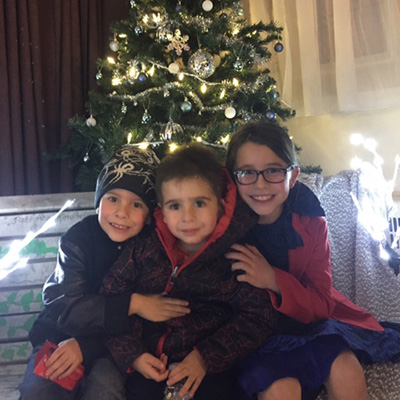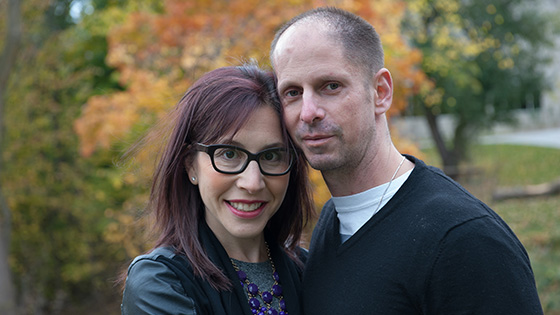
It's been six months since Heidi Wilk's husband, Matthew Morton, passed away. She's learning to adjust to life after Matthew and reimagining what the future has in store for her and her three children. (Photo: UHN)
The best way Heidi Wilk can describe the last five months of her life is a whirlwind.
Heidi's late husband, Matthew Morton, passed away on Aug. 27, 2015 after a seven-year battle with brain cancer.
Today, Heidi's learning to navigate and understand the reality of her new life – continuing Matthew's legacy while trying to embrace her new role as a single working mother of three children under the age of eight.
While no two people experience death and dying the same way, each person has their own unique set of circumstances impacting the way they process grief. We spoke with UHN experts across healthcare disciplines to better understand the challenges of dealing with the death of a loved one and offer insight on how to begin the healing process.
I hope to focus on taking care of me.
This year I will take time for myself. I plan to find a therapist to help me with practical strategies for moving on and dealing with everyday stresses.
I hope to be Heidi again and not just Heidi without a husband.
Slowly I'm trying to stop thinking of myself as 'Heidi with the sick husband who passed away'. I am starting to be 'Heidi a single mom trying to find a new happy and peaceful normal'.
I hope to laugh every day.
I'm proud of small accomplishments like having a calm morning, remembering to put a note in the kids' lunches or having a patient at the hospital thank me.
I hope to stop the timelines.
I hope to stop trying to be the perfect person, mother and friend. What matters is being happy and enjoying the small things. Something Matthew always instilled in us.
*Read more updates and posts from Heidi on Her Magazine.
Returning to work: Bridging the gap between employee and employer
Anthony Ng, Practice Leader, Clinical Nutrition at Toronto Rehab, understands the value of "taking care of your own" when it comes to employers and their responsibility to employees. He's played an instrumental role in facilitating Heidi's transition back to work – bringing colleagues, departments and support networks together throughout the process.
"I remember my first Friday back to work after Matthew's death. I went for my phone and immediately had a flashback of all of the Fridays I would text him in anticipation of our weekend plans," says Heidi.
"He worked at Mount Sinai and I work next door at Toronto Rehab, so we used to meet halfway in the tunnel for lunch. I realized I was going to have to find a way to deal with these bittersweet memories and constant reminders of Matthew."
In consultation with her department managers, Human Resources and Occupational Health, Heidi decided she would return to work three days per week for the first three months and gradually resume to full-time.
"While there may not be one 'right' way to manage these types of delicate life events, it's crucial that the person experiencing a loss returns to the workplace at their own pace, and when they feel ready to take the next step in their grieving process," says Anthony.
"In the healthcare field, we spend a lot of time at work and your colleagues start to feel like a second family – and we want our family to know that we're here for them."
Learn more about
family medical leave in Ontario and your rights and options following the death of a loved one.

Heidi's three children at Christmas. (Photo: Heidi Wilk)
Striking a work-life balance: A marriage between 'personal' and 'professional'
One of the most challenging adjustments after the death of a loved one is the loss of partnership and companionship –someone to share life's joys and burdens with – be it at home or in the workplace.
Working at UHN for more than 16 years, Deborah Russell, Director, Human Resources at Toronto Rehab, has observed a powerful shift toward employee wellness and well-being on and off the job.
"While we like to think home and work life does not impact each other, they absolutely do. It's important that people feel confident and stable in both personal and professional realms of their lives so there can be a healthy balance between the two," says Deborah.
"That's why we've seen such a shift toward more robust wellness strategies in the workplace, including exercise, wellness centres, mindfulness, meditation and stress management."
Like many employers, UHN offers an
Employee and Family Assistance Program (EFAP), a voluntary, confidential counselling and information service for employees and their families. The program is designed to lend support on a variety of topics including family and parenting, childcare and elder care, personal relationships, anxiety and depression, grief and bereavement, financial and legal advice, and much more.
Services by phone are available toll-free 24 hours a day, seven days a week. Off-site support is also available through
Morneau Shepell.

Heidi and late husband, Matthew. He was 39 when he passed away on Aug. 27, 2015. (Photo: Heidi Wilk)
Re-imagining the future and life after loss: 'Forgetting Matthew is scary'
After spending so many months of her life as Matthew's primary palliative caregiver at home, it was incredibly difficult for Heidi to re-imagine her life without her spouse and best friend.
Suraj George,
Spiritual Care Professional at Toronto Rehab, describes the crisis of identity that often occurs after the death of a loved one.
Working with complex spinal cord injury patients at Lyndhurst Centre, Suraj has worked with individuals who have also suffered losses due to traumatic accidents, for example losing the ability to walk or use their hands.
"Loss and grief are incredibly complicated and unique to each person. We help patients re-frame their perspective and discover new meaning in their lives."
Suraj remembers working with a quadriplegic patient who had lost the ability to feel anything from the neck down. The patient struggled every day to accept the loss of their independence, unable to fulfill basic needs like eating a meal, drinking a glass of water, or getting dressed.
"The patient questioned their purpose in life, trying to make sense of a devastating loss. We remind people that while their life is different, the qualities and core of who they are remains the same."
"Feeling anger, guilt, grief and sadness is normal – and it's an important part of the healing process."
As for Heidi, she's still trying to figure out who 'the new Heidi' will be.
"Home palliative care affected me more than I could have ever thought – it's very traumatic to watch someone you love die," says Heidi.
"But now it's the little things I look forward to like getting dressed, packing my lunch, and getting back into a routine."
"Forgetting Matthew is scary, but I understand that it's okay for me to want to be more than 'Heidi taking care of the dying husband'. This is all part of the healing process – knowing we can keep Matthew in our hearts while learning to live meaningfully again."
